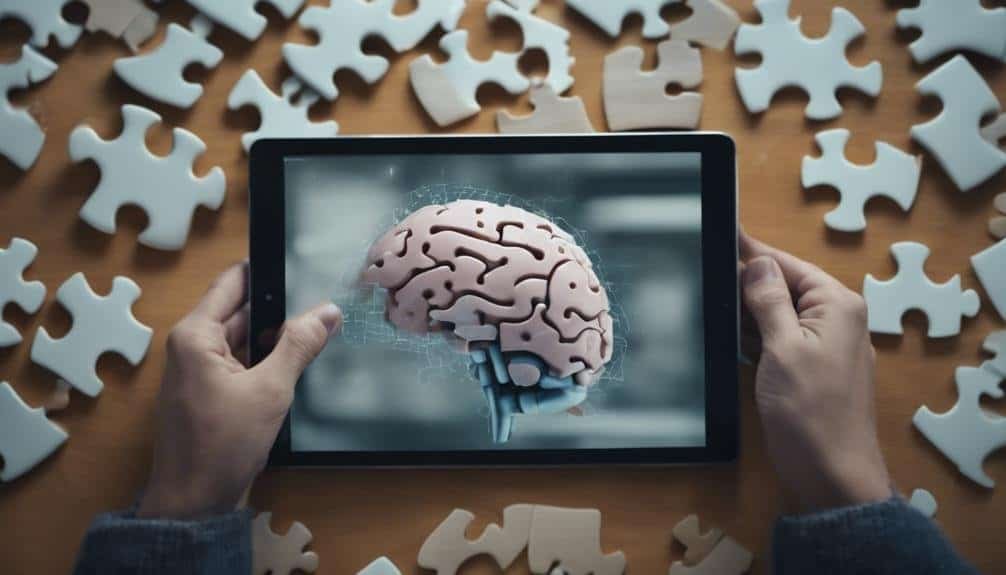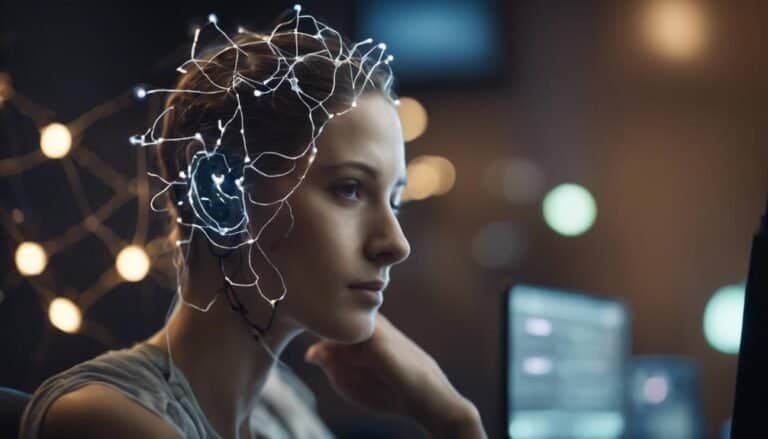Cognitive Remediation for Brain Injury
Imagine a world where individuals recovering from traumatic brain injuries could regain lost cognitive functions through specialized therapy. Picture a scenario where a person who suffered a stroke could relearn essential skills and improve memory, attention, and problem-solving abilities.
How does cognitive remediation achieve this, and what are the innovative strategies employed to enhance brain functions post-injury? The intricate process of cognitive remediation for brain injury encompasses a myriad of techniques and interventions that hold the key to unleashing the brain's potential for recovery and adaptation.
Key Takeaways
- Cognitive training post-brain injury enhances cognitive functions.
- Neuroplasticity aids in brain function recovery and adaptation.
- Tailored cognitive interventions optimize treatment outcomes.
- Targeted cognitive remediation promotes significant improvements.
Understanding Cognitive Remediation
To understand cognitive remediation, it's essential to grasp the intricate processes involved in enhancing cognitive functioning after brain injury. Cognitive training plays a critical role in this process by targeting specific cognitive functions that have been affected by the injury. Brain function is complex, with different regions responsible for various cognitive abilities such as memory, attention, and problem-solving. Following a brain injury, these functions may be impaired, leading to difficulties in daily tasks and overall quality of life.
Cognitive remediation aims to improve brain function by utilizing targeted exercises and interventions to stimulate neural pathways and promote neuroplasticity. Through repetitive practice and cognitive challenges, individuals can enhance their cognitive abilities and compensate for any deficits caused by the brain injury. This approach is rooted in the understanding that the brain has the capacity to reorganize and adapt, especially when exposed to structured cognitive tasks.
Types of Brain Injuries
Brain injuries can be classified into several types based on the specific area of the brain affected and the mechanism of injury. One common type is brain trauma, which can result from a sudden impact or jolt to the head causing damage to the brain tissue. Brain trauma can lead to various conditions such as concussions, contusions, and hematomas.
Concussions are a mild form of brain injury that often result from a blow to the head or violent shaking of the head. Concussion management is vital in ensuring proper recovery and preventing long-term consequences.
Another type of brain injury is a contusion, which involves bruising of the brain tissue due to a direct impact. Hematomas occur when blood vessels in the brain rupture, leading to a localized collection of blood. These types of brain injuries can have diverse effects on cognitive functions, highlighting the importance of appropriate diagnosis and treatment strategies.
Understanding the specific type of brain injury is essential for developing tailored cognitive remediation approaches.
Impact on Cognitive Functions
When considering the impact on cognitive functions following a brain injury, it's important to acknowledge the potential for cognitive function improvement through targeted interventions.
Research has highlighted the role of neuroplasticity in facilitating recovery and reorganization of neural pathways post-injury.
Tailoring cognitive remediation strategies to individual needs and abilities can lead to more personalized and effective treatment outcomes for individuals with brain injuries.
Cognitive Function Improvement
Enhancing cognitive function following a brain injury involves targeted interventions aimed at improving specific cognitive abilities. Attention training and memory enhancement programs are essential for individuals to regain focus and retain new information effectively.
These interventions often involve structured exercises and techniques to enhance attention span and memory recall. Additionally, working on executive functions like problem-solving strategies is crucial for individuals to adapt to daily challenges post-injury.
Cognitive remediation programs tailored to boost executive functions aim to enhance decision-making, planning, and cognitive flexibility. By incorporating these targeted interventions, individuals can experience significant improvements in their cognitive abilities, leading to better overall functioning and quality of life following a brain injury.
Neuroplasticity and Recovery
Understanding the intricate mechanisms of neuroplasticity holds the key to comprehending the impact on cognitive functions during the recovery process after a brain injury. Neuroplasticity research indicates that the brain has the remarkable ability to reorganize itself by forming new neural connections in response to learning or experience. This phenomenon plays a vital role in the recovery of cognitive functions following a brain injury.
Various recovery techniques, such as cognitive training, physical exercise, and sensory stimulation, leverage neuroplasticity to enhance brain function. Studies have shown that targeted interventions can promote neuroplasticity in specific brain regions, leading to improvements in cognitive abilities like memory, attention, and executive function. By harnessing the brain's adaptive capacity through tailored recovery strategies, individuals can optimize their cognitive recovery post-brain injury.
Personalized Treatment Approaches
Utilizing individualized treatment modalities tailored to specific cognitive deficits can greatly enhance post-injury cognitive functions. Personalized interventions have shown promising results in cognitive remediation for brain injury. Case studies have demonstrated the effectiveness of customized rehabilitation programs in improving patient outcomes.
By identifying the unique cognitive impairments of each individual, clinicians can design targeted interventions that address specific areas of weakness. This tailored approach allows for a more efficient and effective rehabilitation process, leading to better cognitive outcomes for patients recovering from brain injuries.
Research in this area highlights the importance of personalized treatment approaches in maximizing cognitive function recovery post-injury. Customized interventions based on individual cognitive profiles can play a critical role in enhancing overall cognitive functioning and quality of life for individuals with brain injuries.
Tailored Therapy Approaches
When considering tailored therapy approaches for cognitive remediation after brain injury, it's important to develop personalized treatment plans that cater to the specific needs and deficits of each individual.
Through targeted cognitive exercises, interventions can be precisely tailored to address the cognitive impairments resulting from the brain injury.
Personalized Treatment Plans
To create effective personalized treatment plans for individuals with brain injuries, clinicians must carefully consider the unique cognitive and functional impairments of each patient. Tailored therapy approaches involve personalized interventions aimed at cognitive enhancement and individualized strategies for brain rehabilitation.
By conducting thorough assessments that explore the specific deficits experienced by the individual, clinicians can design treatment plans that target areas needing improvement. These plans may include a combination of cognitive exercises, psychoeducation, compensatory strategies, and environmental modifications.
The goal is to optimize cognitive functioning, enhance daily living skills, and promote overall well-being. Personalized treatment plans not only address the immediate cognitive needs but also consider the long-term rehabilitation goals for individuals with brain injuries.
Targeted Cognitive Exercises
Tailored therapy approaches for individuals with brain injuries often incorporate targeted cognitive exercises designed to address specific cognitive deficits and enhance overall cognitive functioning. Memory retention is a critical aspect targeted through exercises such as spaced retrieval training, associative memory tasks, and errorless learning techniques. These exercises aim to improve the encoding and retrieval processes of memory, facilitating better long-term storage and recall of information.
Attention training is another key focus, involving exercises like sustained attention tasks, selective attention drills, and dual-task activities. These activities help individuals with brain injuries enhance their ability to focus, sustain attention on relevant stimuli, and switch attention between tasks efficiently.
Benefits of Cognitive Remediation
The advantages of cognitive remediation in the context of brain injury treatment are well-documented in scientific literature. Cognitive training, a key component of cognitive remediation, focuses on improving cognitive functions such as attention, memory, problem-solving, and executive functions. Through structured exercises and tasks, individuals with brain injuries can enhance their cognitive abilities, leading to improvements in daily functioning and quality of life.
Brain rehabilitation, another essential aspect of cognitive remediation, aims to restore and optimize brain function following injury. By engaging in targeted interventions tailored to the individual's cognitive deficits, brain rehabilitation can promote neural plasticity, which is important for recovery. These interventions often involve repetitive practice, gradually increasing in complexity to challenge and stimulate the brain.
Research shows that cognitive remediation programs can result in significant improvements in cognitive abilities, leading to enhanced independence and participation in daily activities. The tailored nature of cognitive training and brain rehabilitation in cognitive remediation underscores its effectiveness in addressing the specific cognitive challenges faced by individuals with brain injuries.
Neuroplasticity and Recovery
How does neuroplasticity contribute to the process of recovery following brain injury?
Neuroplasticity, the brain's ability to reorganize itself by forming new neural connections, plays a vital role in the recovery outcomes of individuals with brain injuries. Research in the field of neurorehabilitation has shown that harnessing brain plasticity through targeted interventions can lead to significant cognitive gains in individuals recovering from brain injuries.
Following a brain injury, the brain undergoes structural and functional changes as a part of the recovery process. By engaging in activities that stimulate specific neural pathways, individuals can promote the rewiring of the brain to compensate for damaged areas. This process of neuroplasticity enables the brain to adapt and reorganize, leading to improvements in cognitive functions such as memory, attention, and executive skills.
Through targeted cognitive remediation programs that capitalize on brain plasticity, individuals can experience enhanced recovery outcomes and improved quality of life post-injury. Understanding and leveraging neuroplasticity is fundamental in optimizing rehabilitation strategies for individuals with brain injuries.
Role of Technology in Therapy
Utilizing advanced technological tools in therapy can greatly enhance the efficacy and precision of interventions for individuals undergoing cognitive remediation following brain injury. Technology integration offers numerous therapeutic benefits that can aid in the recovery process. Virtual reality, in particular, has shown promising results in facilitating cognitive improvement among brain injury patients.
Some key points to ponder regarding the role of technology in therapy include:
- Personalized Interventions: Technology allows for the customization of cognitive remediation programs to suit the specific needs and abilities of each individual.
- Real-time Feedback: Advanced tools can provide immediate feedback on performance, enabling both therapists and patients to track progress effectively.
- Engaging Exercises: Virtual reality environments can make therapy more engaging and enjoyable, potentially increasing motivation and participation in rehabilitation activities.
- Remote Monitoring: Technology can enable therapists to remotely monitor patients' progress and adjust interventions as needed, enhancing continuity of care.
Incorporating these technological advancements into cognitive remediation therapy can revolutionize the rehabilitation process for individuals recovering from brain injuries.
Challenges and Limitations
When addressing cognitive remediation for brain injury, it's important to acknowledge the challenges and limitations that may arise during treatment.
Cognitive deficits following an injury can vary greatly from person to person, necessitating individualized treatment plans tailored to specific needs.
Additionally, determining the long-term effectiveness of cognitive remediation strategies poses a challenge in determining the sustained benefits of the interventions.
Cognitive Deficits After Injury
Cognitive deficits following brain injury present significant challenges and limitations in the domain of cognitive remediation research and practice. These deficits impact various cognitive functions, such as memory retention and attention span, as well as executive functioning and problem-solving skills.
The complexities associated with cognitive deficits after brain injury are influenced by the extent and location of the injury, making each case unique and requiring tailored interventions. The following are key challenges and limitations faced in addressing cognitive deficits after brain injury:
- Variability in the severity and nature of cognitive impairments
- Difficulty in predicting the rate and extent of recovery
- Individual differences in response to cognitive remediation interventions
- Challenges in maintaining motivation and engagement throughout the treatment process
Individualized Treatment Plans
In addressing the challenges and limitations of individualized treatment plans for cognitive remediation after brain injury, it's essential to contemplate the unique characteristics of each patient's cognitive deficits. Customized interventions that target specific cognitive impairments are vital in maximizing treatment efficacy.
Personalized strategies, tailored approaches, and individualized techniques play a significant role in developing effective rehabilitation plans. However, challenges arise in accurately identifying the most suitable interventions for each individual due to the complexity and variability of cognitive deficits post-injury.
Additionally, implementing these individualized treatment plans requires specialized expertise and resources, posing limitations regarding accessibility and affordability. Despite these challenges, the emphasis on personalized approaches remains paramount in optimizing cognitive remediation outcomes for individuals with brain injuries.
Long-Term Effectiveness Assessment
Examining the long-term effectiveness of cognitive remediation interventions post-brain injury presents intricate challenges and limitations that necessitate thorough examination. When evaluating the impact of these interventions over time, several factors come into play:
- Rehabilitation Progress: Tracking the ongoing progress of patients in cognitive remediation programs can be complex due to varying rates of improvement and potential plateaus.
- Patient Satisfaction: Determining the satisfaction levels of individuals undergoing cognitive remediation is critical for understanding the acceptability and feasibility of long-term intervention.
- Cognitive Function Maintenance: Sustaining improvements in cognitive function beyond the intervention period is essential but can be challenging to measure accurately.
- Real-World Application: Translating gains made in cognitive remediation to everyday tasks and activities is a critical aspect that requires thorough evaluation for a thorough effectiveness assessment.
Integrating Cognitive Skills
With careful attention to detail, integrating cognitive skills post-brain injury can greatly enhance overall rehabilitation outcomes. Cognitive enhancement strategies that target specific cognitive functions have shown promising results in promoting brain plasticity and functional recovery following injury. Skill integration is a key component of cognitive rehabilitation, focusing on the development of compensatory strategies and the improvement of cognitive abilities.
Research suggests that incorporating cognitive enhancement strategies such as memory training, attentional exercises, and problem-solving tasks can lead to significant improvements in cognitive functioning for individuals recovering from brain injuries. By systematically integrating these strategies into rehabilitation programs, individuals can experience enhanced cognitive abilities, improved daily functioning, and a higher quality of life.
Moreover, skill integration in cognitive rehabilitation involves tailoring interventions to match the individual's specific cognitive deficits and goals, ensuring a personalized approach to treatment. This targeted method has been shown to be effective in facilitating cognitive recovery and promoting long-term cognitive functioning post-injury.
Long-Term Outcomes and Success
For individuals recovering from brain injuries, understanding the long-term outcomes and factors contributing to success in cognitive remediation is essential for optimizing rehabilitation strategies. Long-term outcomes following cognitive remediation for brain injury can vary depending on various factors. Research indicates that cognitive function and success rates in cognitive remediation programs are influenced by several key elements:
- Intensity of Treatment: The frequency and duration of cognitive remediation sessions can impact long-term outcomes substantially.
- Individualized Approach: Tailoring the rehabilitation strategies to the specific cognitive deficits of each individual can enhance the success of the program.
- Multidisciplinary Team: Involvement of a diverse team of healthcare professionals, such as neuropsychologists, occupational therapists, and speech therapists, can lead to more thorough and successful outcomes.
- Adherence and Persistence: Consistent participation and adherence to the cognitive remediation program over an extended period are essential for achieving positive long-term results.
Understanding these factors and incorporating them into rehabilitation plans can improve cognitive function and overall success rates in individuals undergoing cognitive remediation for brain injury.
Frequently Asked Questions
Can Cognitive Remediation Be Effective for All Types of Brain Injuries?
Cognitive remediation can vary in effectiveness for different brain injuries. Long-term outcomes may depend on the type and severity of the injury. Patient eligibility and cost considerations are pivotal factors to contemplate when determining the best treatment approach.
How Long Does It Typically Take to See Improvements in Cognitive Functions After Starting Cognitive Remediation Therapy?
Typically, improvements in cognitive functions post-cognitive remediation therapy can vary based on individual factors like severity of injury and therapy adherence. It may take weeks to months to observe significant recovery progress and therapy effectiveness.
Are There Any Specific Age Restrictions for Individuals Undergoing Cognitive Remediation Therapy?
Hey there! When it comes to cognitive remediation therapy, age restrictions aren't common. Therapy can benefit individuals of various ages by improving cognitive abilities and brain function. It's all about enhancing your mental skills!
Is Cognitive Remediation Therapy Covered by Insurance or Is It Typically an Out-Of-Pocket Expense?
Insurance coverage for cognitive remediation therapy varies. Some policies may cover it partially or fully, while others may deem it an out-of-pocket expense. Understanding your plan's benefits and costs is essential before pursuing treatment options.
Are There Any Potential Risks or Side Effects Associated With Cognitive Remediation Therapy for Brain Injury?
When considering cognitive remediation therapy for brain injury, it's important to weigh potential risks and side effects against long-term outcomes and patient satisfaction. Research on these aspects can help you make informed decisions about your treatment plan.
Conclusion
To sum up, cognitive remediation for brain injury is like a tailored workout program for the mind, helping individuals rebuild and strengthen their cognitive functions.
Through personalized therapy approaches and the integration of technology, significant improvements can be achieved in cognitive skills.
Despite challenges and limitations, long-term outcomes show promising success in enhancing cognitive abilities and overall quality of life for individuals with brain injuries.
This research-focused approach highlights the importance of cognitive remediation in rehabilitation.







